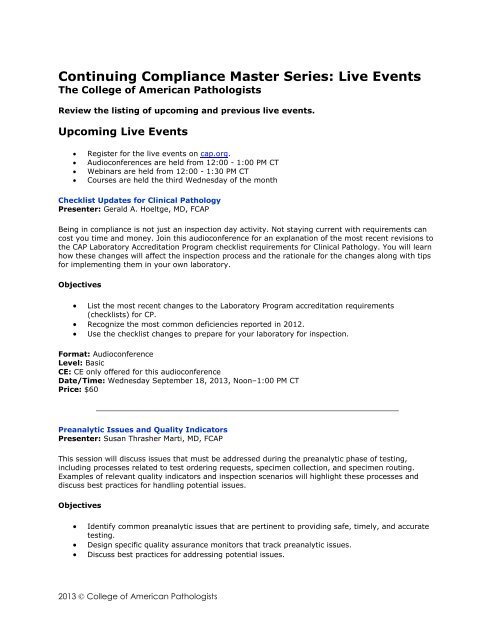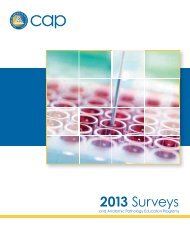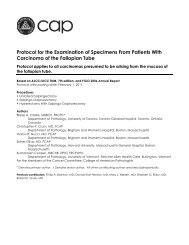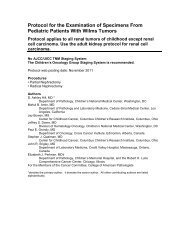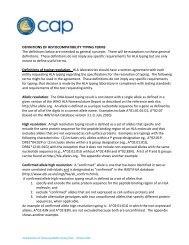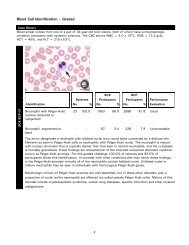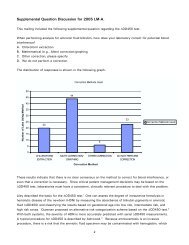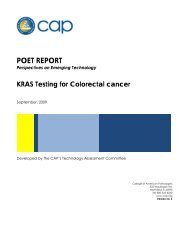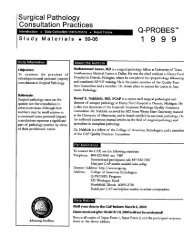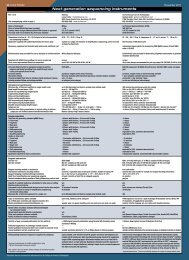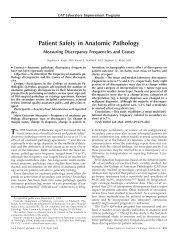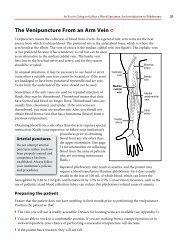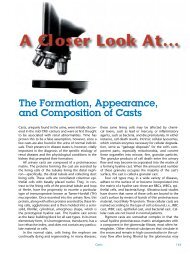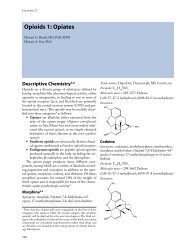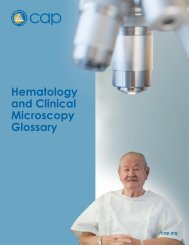2013 Courses - College of American Pathologists
2013 Courses - College of American Pathologists
2013 Courses - College of American Pathologists
Create successful ePaper yourself
Turn your PDF publications into a flip-book with our unique Google optimized e-Paper software.
Continuing Compliance Master Series: Live Events<br />
The <strong>College</strong> <strong>of</strong> <strong>American</strong> <strong>Pathologists</strong><br />
Review the listing <strong>of</strong> upcoming and previous live events.<br />
Upcoming Live Events<br />
<br />
<br />
<br />
<br />
Register for the live events on cap.org.<br />
Audioconferences are held from 12:00 - 1:00 PM CT<br />
Webinars are held from 12:00 - 1:30 PM CT<br />
<strong>Courses</strong> are held the third Wednesday <strong>of</strong> the month<br />
Checklist Updates for Clinical Pathology<br />
Presenter: Gerald A. Hoeltge, MD, FCAP<br />
Being in compliance is not just an inspection day activity. Not staying current with requirements can<br />
cost you time and money. Join this audioconference for an explanation <strong>of</strong> the most recent revisions to<br />
the CAP Laboratory Accreditation Program checklist requirements for Clinical Pathology. You will learn<br />
how these changes will affect the inspection process and the rationale for the changes along with tips<br />
for implementing them in your own laboratory.<br />
Objectives<br />
List the most recent changes to the Laboratory Program accreditation requirements<br />
(checklists) for CP.<br />
Recognize the most common deficiencies reported in 2012.<br />
Use the checklist changes to prepare for your laboratory for inspection.<br />
Format: Audioconference<br />
Level: Basic<br />
CE: CE only <strong>of</strong>fered for this audioconference<br />
Date/Time: Wednesday September 18, <strong>2013</strong>, Noon–1:00 PM CT<br />
Price: $60<br />
Preanalytic Issues and Quality Indicators<br />
Presenter: Susan Thrasher Marti, MD, FCAP<br />
This session will discuss issues that must be addressed during the preanalytic phase <strong>of</strong> testing,<br />
including processes related to test ordering requests, specimen collection, and specimen routing.<br />
Examples <strong>of</strong> relevant quality indicators and inspection scenarios will highlight these processes and<br />
discuss best practices for handling potential issues.<br />
Objectives<br />
<br />
<br />
<br />
Identify common preanalytic issues that are pertinent to providing safe, timely, and accurate<br />
testing.<br />
Design specific quality assurance monitors that track preanalytic issues.<br />
Discuss best practices for addressing potential issues.<br />
<strong>2013</strong> © <strong>College</strong> <strong>of</strong> <strong>American</strong> <strong>Pathologists</strong>
Format: Webinar<br />
Level: Basic<br />
CE: CE only <strong>of</strong>fered for this webinar<br />
Date/Time: Wednesday October 16, <strong>2013</strong> Noon–1:30 PM CT<br />
Price: $295<br />
Postanalytic Issues and Quality Indicators<br />
Presenters: Rawhi Omar, MD, PhD, FCAP, Technical staff, CAP Laboratory Accreditation<br />
This session will discuss issues that must be addressed during the postanalytic phase <strong>of</strong> testing. These<br />
issues include, among many others, ensuring that test results are timely and accurately generated,<br />
transmitted, and interpreted. Examples <strong>of</strong> relevant quality indicators and inspection process scenarios<br />
will highlight these issues and discuss best practices for handling them.<br />
Objectives<br />
<br />
<br />
<br />
Identify common postanalytic issues that are pertinent to providing safe, timely, and accurate<br />
testing.<br />
Design specific quality assurance monitors that track postanalytic issues.<br />
Analyze sources <strong>of</strong> deviation from standards and provide guidance for corresponding<br />
preventive and corrective actions.<br />
Format: Webinar<br />
Level: Basic<br />
CE: CE only <strong>of</strong>fered for this webinar<br />
Date/Time: Wednesday November 20, <strong>2013</strong>, Noon–1:30 PM CT<br />
Price: $295<br />
Previous Live Events<br />
These events are available as recorded sessions.<br />
<br />
<br />
<br />
If you registered for the event and were unable to attend, the recorded session is<br />
available four weeks after the live event and will be available for one year.<br />
Contact your site coordinator to access the recorded session.<br />
CE/CME credit is not available for the recorded session.<br />
CAP Accreditation Requirements for Validation <strong>of</strong> Laboratory Tests<br />
Presenter: Stephen J. Sarewitz, MD, FCAP<br />
This webinar will review the CAP accreditation requirements for validation <strong>of</strong> laboratory tests. The<br />
discussion will include analytic and clinical validation, as well as possible new requirements that may<br />
evolve from the FDA's plan to directly regulate certain laboratory-developed tests<br />
Objectives<br />
<br />
<br />
<br />
Perform appropriate validation studies in accordance with CAP requirements prior to<br />
implementing new tests, including FDA cleared/approved tests and laboratory-developed tests.<br />
Understand validation requirements for FDA cleared/approved tests modified by the<br />
laboratory.<br />
Appropriately deal with issues related to validation <strong>of</strong> tests on unusual matrices.<br />
<strong>2013</strong> © <strong>College</strong> <strong>of</strong> <strong>American</strong> <strong>Pathologists</strong>
Format: Webinar<br />
Level: Advanced<br />
Implementing Next Generation Sequencing (NGS) as a Clinical Tool in the Laboratory<br />
Presenter: Nazneen Aziz, PhD<br />
Next Generation Sequencing is a revolutionary new technology that is being applied for diagnostic<br />
medicine. This session will discuss the complexities <strong>of</strong> this new tool and related CAP activities. New<br />
CAP standards related to the laboratory analytical wet bench and bioinformatics workflow for NGS will<br />
be introduced.<br />
Objectives<br />
<br />
<br />
<br />
<br />
Learn about a revolutionary new technology that is being applied for diagnostic medicine.<br />
Recognize the complexities <strong>of</strong> the next generation sequencing (NGS) workflow.<br />
Identify CAP’s activities in the NGS area.<br />
Identify the standards developed by the CAP for the laboratory analytical wet bench and<br />
bioinformatics workflow for NGS.<br />
Format: Audioconference<br />
Level: Advanced<br />
Analytical Measurement Range: Examples and Approaches<br />
Presenter: William Castellani, MD, FCAP<br />
This session will review the concept <strong>of</strong> the analytical measurement range and what must be done to<br />
ensure compliance with CAP checklist requirements and CLIA requirements for reportable range<br />
verification and calibration verification. Examples that illustrate the concepts and approaches to<br />
compliance will be discussed.<br />
Objectives<br />
<br />
<br />
<br />
Define and describe the analytical reportable range and how it compares to the CLIA'88<br />
reportable range.<br />
Compare the CAP requirements for validation <strong>of</strong> the analytical measurement range to CLIA'88<br />
calibration verification.<br />
Discuss strategies for satisfying accreditation requirements.<br />
Format: Audioconference<br />
Level: Basic<br />
Point-<strong>of</strong>-Care Testing for Coagulation: Limitations and Challenges<br />
Presenter: Russell Higgins, MD, FCAP<br />
<strong>2013</strong> © <strong>College</strong> <strong>of</strong> <strong>American</strong> <strong>Pathologists</strong>
Point-<strong>of</strong>-care testing will be discussed from the perspective <strong>of</strong> a hemostasis core laboratory that<br />
oversees point-<strong>of</strong>-care testing. PT/INR, ACT, and quantitative D-dimer methods will be discussed.<br />
Challenges <strong>of</strong> appropriate utilization, intralaboratory comparisons, and methodology limitations will be<br />
addressed.<br />
Objectives<br />
<br />
<br />
<br />
<br />
Apply point-<strong>of</strong>-care testing for PT/INR, ACT, and D-dimer to appropriate clinical settings.<br />
Identify point-<strong>of</strong>-care testing limitations for coagulation.<br />
Compare point-<strong>of</strong>-care and bench top methods.<br />
Develop strategies to improve utilization <strong>of</strong> point-<strong>of</strong>-care testing for coagulation.<br />
Format: Audioconference<br />
Level: Basic<br />
Integrating Labs—Why, When, and How—The Good, the Bad, and the Ugly<br />
Presenter: Paul Urie, MD, PhD, FCAP<br />
This webinar will help participants understand how laboratory integration can benefit individual<br />
laboratories and create a laboratory system that increases standardization and efficiencies while<br />
reducing costs. Participants will learn how to integrate laboratories and learn to identify when clinical<br />
and business conditions are appropriate to start the process. Discussion will include how to manage<br />
change, extol the virtues <strong>of</strong> integration, and how to avoid the pitfalls that might delay or doom the<br />
integration process.<br />
Objectives<br />
<br />
<br />
<br />
Identify the benefits, challenges, and common barriers to laboratory integration.<br />
Identify laboratory strengths, procedures, organizational resources, and key laboratory<br />
personnel needed to facilitate successful laboratory integration.<br />
Define components <strong>of</strong> the laboratory integration process to maximize benefits, reduce<br />
challenges, avoid pitfalls, and remain friends.<br />
Format: Webinar<br />
Level: Basic<br />
Checklist Updates for Anatomic Pathology<br />
Presenter: Gerald A. Hoeltge, MD, FCAP<br />
Being in compliance is not just an inspection day activity. Not staying current with requirements can<br />
cost you time and money. Join this audioconference for an explanation <strong>of</strong> the most recent revisions to<br />
the CAP Laboratory Accreditation Program checklist requirements for Anatomic Pathology. You will<br />
learn how these changes will affect the inspection process and the rationale for the changes along with<br />
tips for implementing them in your own laboratory.<br />
Objectives<br />
<strong>2013</strong> © <strong>College</strong> <strong>of</strong> <strong>American</strong> <strong>Pathologists</strong>
List the most recent changes to the Laboratory Program accreditation requirements<br />
(checklists) for AP.<br />
Recognize the most common deficiencies reported in 2012.<br />
Use the checklist changes to prepare for your laboratory for inspection.<br />
Format: Audioconference<br />
Level: Basic<br />
<strong>2013</strong> © <strong>College</strong> <strong>of</strong> <strong>American</strong> <strong>Pathologists</strong>


